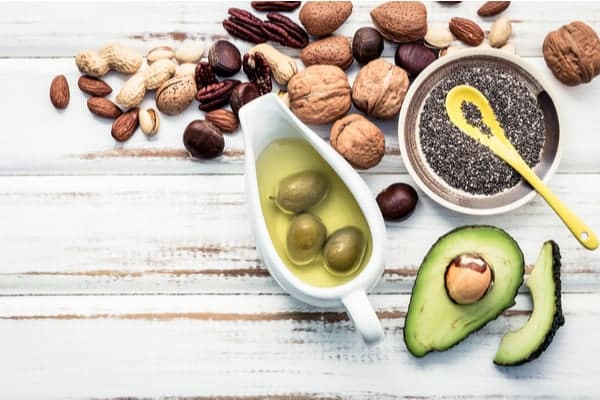Dealing with chronic anxiety is no easy task. Those who suffer from it often struggle with an unfocused mind, heart palpitations, and an inability to sleep deeply each night. Not only do these symptoms compromise one’s quality of life, but research shows that stress and disease are intimately connected.
Whether you’re looking for ways to lower your own anxiety, or ways to help a loved one or a client, this article will walk you through eight ways to reduce anxiety naturally.
What is Anxiety?
According to the American Psychological Association, anxiety is a broad range of disorders defined by “an emotion categorized by feelings of tension, worried thoughts, and physical changes.” Anxiety disorders can trigger nervousness, apprehension, and fear, and their severity can range from mildly unsettling to debilitating.
Some of the most common anxiety disorders today include the following:
- Generalized Anxiety Disorder (GAD)
- Obsessive-compulsive Disorder (OCD)
- Post-Traumatic Stress Disorder (PTSD)
- Social Anxiety Disorder
- Panic Disorder
While you might feel alone if you’re living with anxiety, the truth is that these disorders affect more than 40 million people across the United States, making it the most common category of mental illnesses in the country. Even so, just over a third of sufferers receive adequate treatment.
Dealing with anxiety can be a lifelong struggle, as most people first develop the symptoms during childhood or in their teenage years. Women under 35 tend to be the most diagnosed population, especially those living in western countries.
Anxiety manifests itself differently for everyone, but the symptoms usually include a sense of losing control, either through nightmares, panic attacks, or a feeling that there is a disconnect between your mind and body. Many people with anxiety struggle to fall asleep or can’t concentrate on what’s in front of them.
Your Body and Anxiety: An Evolutionary Connection
Why is anxiety so prevalent today? Our evolutionary heritage can explain part of this answer. During the days of living as hunter-gathers, feelings of distress came from immediate physical threats like attacking animals. These threats primed people for taking action by triggering biological symptoms like a racing heartbeat, rapid breathing, sweating, and hyper-focus on the immediate surroundings.
While these traits helped early humans survive the threats in their world, the symptoms of stress are often inconvenient for modern dangers, which tend to produce a less pressing threat. Today’s anxieties are more often related to work, money, family and health problems, rather than physical attacks that trigger these “fight or flight” reactions.
Since our bodies’ stress responses haven’t caught up to the world’s threats, you’re still likely to suffer from a racing heart when you feel anxious about work. Learning to deal with this innate response will help you reduce anxiety over the long run.

Get Your Free Guide
Learn How to Start a Fulfilling, Impactful Career as a Holistic Health Coach
You’ll learn:
- Why holistic health matters
- If holistic health coaching is right for you
- What career opportunities exist for health coaches
- And more!
Eight Best Natural Ways to Reduce Anxiety
If you’re looking to quell your chronic anxiety, you might be amazed at how effective natural methods can be to keep your symptoms under control. These strategies can be used alone or combined to help you lower your stress levels permanently
1. Practice Relaxation Techniques
One of the best ways to calm down anxiety in the moment is to practice relaxation techniques, especially by refocusing your mind with meditative breathing.
Intentionally slowing down your breath shows great promise for improving anxiety and lowering your stress levels, as it’s almost impossible to inhale deeply and remain anxious. You can practice the 4-7-8 breathing method by exhaling completely, then inhaling through your nose for four counts. Hold your breath as you count to seven, and then release it for a count of eight. For best results, repeat this pattern at least three times whenever you feel a wave of anxiety.
If you want expert help developing better relaxation routines, consider seeking out psychological counseling, especially cognitive behavioral therapy (CBT). Your therapist will help you recognize and change harmful thought patterns that are at the root of your anxious thoughts, and the techniques you learn will help you function in healthier ways in the situations that trigger your anxiety.
2. Exercise Regularly
There’s no limit to the ways regular exercise benefits your body, and calming down anxiety is no exception. Not only does working out allow you to release stress energy, but it helps you stick to your commitments for healthier living. For instance, one study of people trying to quit smoking found that exercise reduced the anxiety they experienced while stopping, and further research shows that regular exercise helps raise self-esteem levels.
How long should you commit to working out before you’ll begin to feel the benefits? Experts suggest that a minimum of twenty-one minutes is the magic amount. So long as you get your heart rate up for close to half an hour each day, you’ll experience far-reaching benefits for your health and anxiety levels.
To ramp up the health effects, move your workout outdoors. The sun exposure increases your vitamin D levels, which naturally decreases the symptoms of depression and anxiety disorders. Likewise, a Japanese study found that walking in a wooded area could lower stress levels more than taking the same length of walk through a city. Complete your exercise among the trees, and your stress levels should stay more manageable.
3. Sort Your Thoughts Through Writing
For many people, the most significant problems with stress come from an inability to articulate what’s wrong. One way to organize your thoughts might be to write them down. Research shows that expressing anxiety through journaling can help people better cope with it and a study from 2016 shows that creative writing is a proven way for teens and children to process their anxiety healthily.
4. Spend Time with Animals
There’s a reason why dogs and cats are considered companion animals. Pets provide love and support without strings attached, and recent research proves that they offer mental health benefits for those who deal with anxiety. For example, a systematic review of people who have lived through trauma found that grooming and taking care of horses alleviated some of the worst symptoms.
Even furless animals improve your wellbeing, as a study found that the psychological health of older adults improved after they cared for crickets.
5. Practice Time Management Strategies
In today’s busy world, a large portion of stress comes from feeling like you have lost control of your schedule. This means that practicing better time management strategies can organize both your calendar and your head to relieve anxiety. Investing the time to organize your life on an online calendar can help you stay ahead of the stress, as can breaking each overwhelming project down into manageable steps.
6. Drink Tea (Preferably Green or Chamomile)
Few things feel more relaxing than a hot cup of tea, and the right variety can physically lower your stress levels. According to one study from the University of Pennsylvania, the compounds contained within chamomile can reduce the symptoms of generalized anxiety disorders when taken daily for at least eight weeks. That’s because the plant contains apigenin and luteolin, two chemicals that promote relaxation.
Likewise, Japanese monks have relied on green tea for centuries to keep them alert and relaxed through their multi-hour meditation sessions. Part of the benefit comes from the amino acid L-theanine, which works to control blood pressure and relieve anxiety. A cup (or three) a day can help anxiety prone people relax when their stress levels start to rise.
7. Stay Full of Healthy Foods
If you want to stave off anxiety, stop starving yourself throughout the day. It’s common for people with anxiety to skip breakfast, which is counterproductive if you wish to feel less irritable. A better option is to fill up on a satiating early meal.
Anxiety attacks are more common when your blood sugar is low, so munch on a handful of nuts or other nutrient-dense snacks when you feel one coming on. Mealtimes should be primarily plant-based and consist of leafy greens as well as natural sources of b-complex vitamins and omega-3 fatty acids.
Grabbing junk food instead produces the opposite effect, as the spike and drop in your blood sugar levels leave you with varying energy levels throughout the day. This triggers mood swings that make it harder to stay in control of your anxiety symptoms.
8. Consider CBD Oil
The topic of cannabis might be controversial today, but CBD oil is gaining international attention for its ability to ease physical pain and relieve anxiety. As this hemp-derived product is free of tetrahydrocannabinol, it won’t make you “high” like marijuana does. So long as it comes from hemp instead of marijuana, CBD oil is legal throughout the United States.
More Strategies to Relieve Anxiety
There are many more ways to reduce anxiety, and the impacts are as nuanced as the people trying them. Other strategies include the following:
- Get eight hours of sleep each night
- Avoid using stimulants like caffeine, alcohol, and cigarettes
- Consider adding a valerian root supplement
- Cultivate a morning meditation practice
- Practice self-visualization to acknowledge where you are and where you want to be
- Laugh loudly and often




